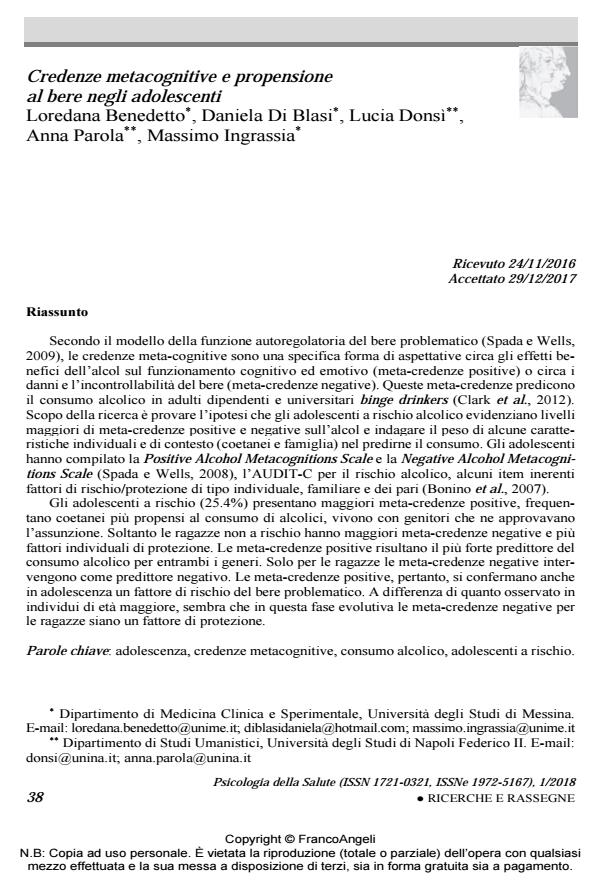Credenze metacognitive e propensione al bere negli adolescenti
Titolo Rivista PSICOLOGIA DELLA SALUTE
Autori/Curatori Loredana Benedetto, Daniela Di Blasi, Lucia Donsì, Anna Parola, Massimo Ingrassia
Anno di pubblicazione 2018 Fascicolo 2018/1
Lingua Italiano Numero pagine 25 P. 38-62 Dimensione file 318 KB
DOI 10.3280/PDS2018-001003
Il DOI è il codice a barre della proprietà intellettuale: per saperne di più
clicca qui
Qui sotto puoi vedere in anteprima la prima pagina di questo articolo.
Se questo articolo ti interessa, lo puoi acquistare (e scaricare in formato pdf) seguendo le facili indicazioni per acquistare il download credit. Acquista Download Credits per scaricare questo Articolo in formato PDF

FrancoAngeli è membro della Publishers International Linking Association, Inc (PILA), associazione indipendente e non profit per facilitare (attraverso i servizi tecnologici implementati da CrossRef.org) l’accesso degli studiosi ai contenuti digitali nelle pubblicazioni professionali e scientifiche.
Secondo il modello della funzione autoregolatoria del bere problematico (Spada e Wells, 2009), le credenze meta-cognitive sono una specifica forma di aspettative circa gli effetti benefici dell’alcol sul funzionamento cognitivo ed emotivo (meta-credenze positive) o circa i danni e l’incontrollabilità del bere (meta-credenze negative). Queste meta-credenze predicono il consumo alcolico in adulti dipendenti e universitari binge drinkers (Clark et al., 2012). Scopo della ricerca è provare l’ipotesi che gli adolescenti a rischio alcolico evidenziano livelli maggiori di meta-credenze positive e negative sull’alcol e indagare il peso di alcune caratteristiche individuali e di contesto (coetanei e famiglia) nel predirne il consumo. Gli adolescenti hanno compilato la Positive Alcohol Metacognitions Scale e la Negative Alcohol Metacognitions Scale (Spada e Wells, 2008), l’AUDIT-C per il rischio alcolico, alcuni item inerenti fattori di rischio/protezione di tipo individuale, familiare e dei pari (Bonino et al., 2007). Gli adolescenti a rischio (25.4%) presentano maggiori meta-credenze positive, frequentano coetanei più propensi al consumo di alcolici, vivono con genitori che ne approvavano l’assunzione. Soltanto le ragazze non a rischio hanno maggiori meta-credenze negative e più fattori individuali di protezione. Le meta-credenze positive risultano il più forte predittore del consumo alcolico per entrambi i generi. Solo per le ragazze le meta-credenze negative intervengono come predittore negativo. Le meta-credenze positive, pertanto, si confermano anche in adolescenza un fattore di rischio del bere problematico. A differenza di quanto os-servato in individui di età maggiore, sembra che in questa fase evolutiva le meta-credenze negative per le ragazze siano un fattore di protezione.
Parole chiave:Adolescenza, credenze metacognitive, consumo alcolico, adolescenti a rischio.
- Novel Coronavirus Outbreak and Career Development: A Narrative Approach Into the Meaning for Italian University Graduates Anna Parola, in Frontiers in Psychology 2255/2020
DOI: 10.3389/fpsyg.2020.02255 - Mental Health Through the COVID-19 Quarantine: A Growth Curve Analysis on Italian Young Adults Anna Parola, Alessandro Rossi, Francesca Tessitore, Gina Troisi, Stefania Mannarini, in Frontiers in Psychology 567484/2020
DOI: 10.3389/fpsyg.2020.567484
Loredana Benedetto, Daniela Di Blasi, Lucia Donsì, Anna Parola, Massimo Ingrassia, Credenze metacognitive e propensione al bere negli adolescenti in "PSICOLOGIA DELLA SALUTE" 1/2018, pp 38-62, DOI: 10.3280/PDS2018-001003